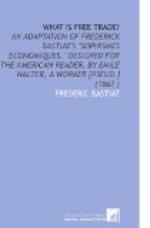If, then, it is needful to protect national labor against the competition of foreign labor, it is not less so, to protect human labor against the rivalry of mechanical labor.
So, he who adheres to the protective policy, if he has but a small amount of logic in his brain, must not stop when he has prohibited foreign products; he must farther proscribe the shuttle and the plough.
And that is the reason why we prefer the logic of those men who, declaiming against the invasion of exotic merchandise, have, at least, the courage to declaim as well against the excess of production due to the inventive power of the human mind.
Hear such a Conservative:—“One of the strongest arguments against liberty of commerce, and the too great employment of machines, is, that very many workmen are deprived of work, either by foreign competition, which is destructive to their manufactures, or by machines, which take the place of men in the workshops.”
This gentleman perfectly sees the analogy, or rather, let us say, the identity, existing between importations and machines; that is the reason he proscribes both: and truly there is some pleasure in having to do with reasonings, which, even in error, pursue an argument to the end.
Let us look at the difficulty in the way of its soundness.
If it be true, a priori, that the domain of invention and that of labor cannot be extended, except at the expense of one or the other, it is in the place where there are most machines, Lancaster or Lowell, for example, that we shall meet with the fewest workmen. And if, on the contrary, we prove a fact, that mechanical and hand work co-exist in a greater degree among wealthy nations than among savages, we must necessarily conclude that these two powers do not exclude each other.
It is not easy to explain how a thinking being can taste repose in presence of this dilemma:
Either—“The inventions of man do not injure labor, as general facts attest, since there are more of both among the English and Americans than among the Hottentots and Cherokees. In that case I have made a false reckoning, though I know neither where nor when I got astray. I should commit the crime of treason to humanity if I should introduce my error into the legislation of my country.”
Or else—“The discoveries of the mind limit the work of the arms, as some particular facts seem to indicate; for I see daily a machine do the labor of from twenty to a hundred workmen, and thus I am forced to prove a flagrant, eternal, incurable antithesis between the intellectual and physical ability of man; between his progress and his comfort; and I cannot forbear saying that the Creator of man ought to have given him either reason or arms, moral force, or brutal force, but that he has played with him in conferring upon him opposing faculties which destroy one another.”
The difficulty is pressing. Do you know how they get rid of it? By this singular apothegm:




